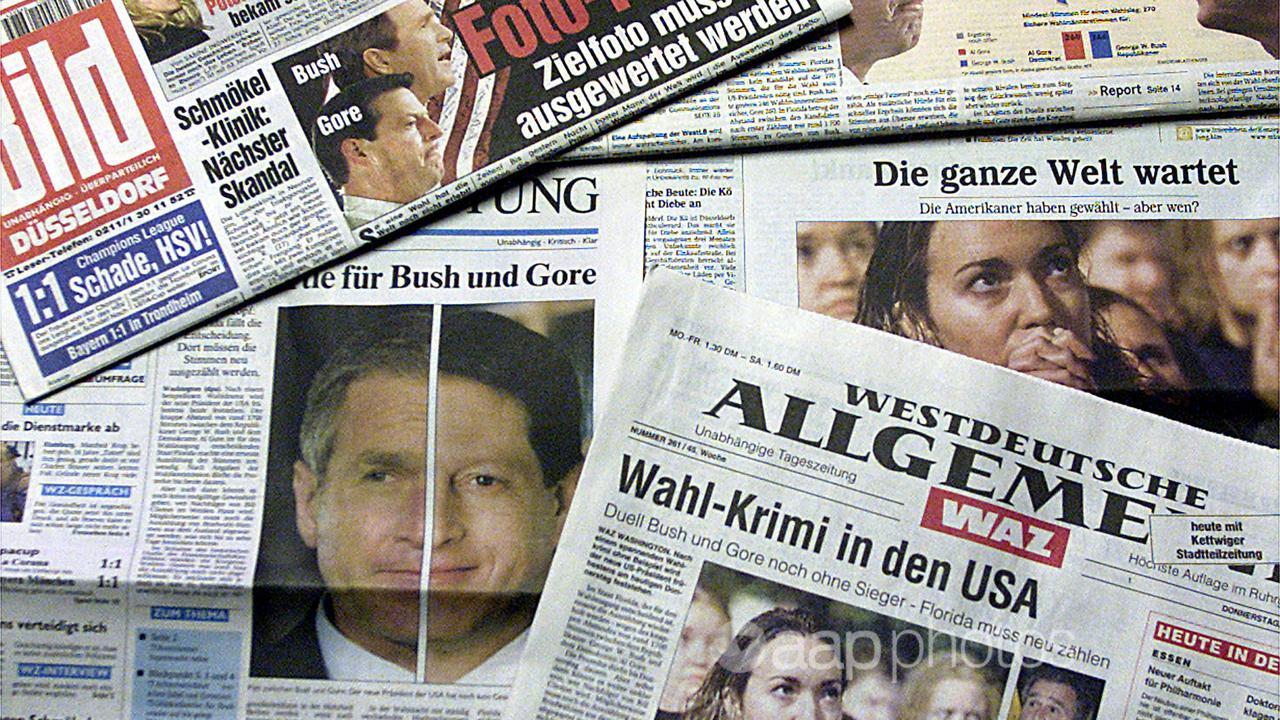An Instagram user has attempted to shine a light on media distrust in Australia with a claim that German newspapers must guarantee at least 75 per cent of their articles are factual.
According to the Instagram post (screenshot here), if a German newspaper does not meet the 75 per cent threshold, it is officially considered a magazine.
However, experts told AAP FactCheck no such rule exists in Germany.
On June 18, the Australian Instagram page posted the meme. It reads: “In Germany, if a newspaper cannot GUARANTEE 75% of its articles are factual then it is not allowed to call itself a newspaper,It is, officially, a magazine and HAS to refer to itself as such.Oh just imagine that rule in Australia.”
The meme was created from a screenshot of a tweet that originally referred to the United Kingdom instead of Australia.
The Australian version of the meme has been republished on Facebook here, here, here, and here.
Multiple German sources told AAP FactCheck the claim is wrong.
A spokesman for the German federal government’s minister of culture and media said there was no rule that required newspapers to publish a certain proportion of factual content.
“In Germany, there is no legal regulation that would define printed newspapers as requiring 75% factuality,” the spokesman told AAP FactCheck in an email.
“There are four criteria by which a newspaper is distinguished from a magazine, but which are not laid down by law: periodicity, topicality, universality and publicity,” the spokesman said.
Dr Stephan Dreyer, a senior researcher in media law and governance at the Hans-Bredow-Institute in Hamburg, agreed there is no official rule in Germany that defines a magazine or newspaper based on factuality of content.
“There is no legal norm in Germany’s press and media laws or self-regulatory codes that either defines what a ‘magazine’ is or that designates a specific term to a publication based on the percentage of its factuality,” Dr Dreyer said in an email to AAP FactCheck.
Dr Dreyer said that from a legal point of view, both newspapers and magazines were obligated to follow the same truthful reporting standards.
“The provisions in press law, including the obligation to report truthfully and apply journalistic duties of care in reporting, are applied to all forms of printed matter/publications that are being published regularly … no matter what the form, type, or content is,” he said.
The German Press Council, a self-regulatory organisation of journalist and print publisher associations, has developed a press code that sets out guidelines around truthfulness and other matters.
However, the guidelines make no mention of newspapers being redefined as magazines if they cannot guarantee 75 per cent of articles are factual.
A spokeswoman for the German Press Council, Sonja Volkmann-Schluck, told AAP FactCheck the claim is not true.
“Newspapers and magazines in Germany have committed themselves to the press code and its principles of truthfulness (section 1) and duty of care (section 2)” Ms Volkmann-Schluck said in an email.
Professor Christoph Neuberger, from the Institute for Media and Communication Studies at the Freie Universität Berlin told AAP FactCheck in an email that the claim was “complete nonsense”.
“Such a rule doesn’t exist in Germany,” Prof Neuberger said.
The Verdict
Experts and media authorities in Germany told AAP FactCheck there is no rule that requires German newspapers to guarantee 75 per cent of their articles are factual.
There are no laws or media codes that define newspapers and magazines in the way suggested by the meme.
False – the claim is inaccurate.
* AAP FactCheck is an accredited member of the International Fact-Checking Network. To keep up with our latest fact checks, follow us on Facebook, Twitter and Instagram.
All information, text and images included on the AAP Websites is for personal use only and may not be re-written, copied, re-sold or re-distributed, framed, linked, shared onto social media or otherwise used whether for compensation of any kind or not, unless you have the prior written permission of AAP. For more information, please refer to our standard terms and conditions.


















